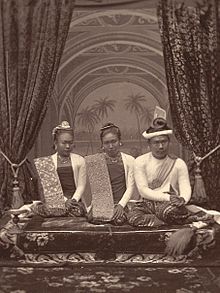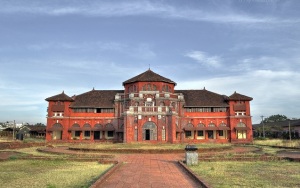There is one episode in the history of modern Southeast Asia that I find endlessly fascinating, and that is the fall of the Burmese monarchy. Perhaps this is because Amitav Ghosh described it so captivatingly in his historical novel, The Glass Palace, or perhaps it is simply because it is a fascinating moment in history.
The gist of the story is that King Thibaw and Queen Supayalat were given an ultimatum in 1884 by the British to allow a British “resident” to be stationed at the palace and to take control of various functions, such as foreign affairs, or to face war.
Would the appointment of a British resident open the door to the gradual usurpation of all control by the British? Or was this the only way at that time of colonial conquest around the globe to maintain some form of autonomy?
The story goes that Queen Supayalat resisted the ultimatum as she was pregnant with what she believed must be a son, and she wanted to ensure that in the future her son would have a kingdom to rule over. From her perspective, the story goes, to let a British resident enter the palace would be the first step in losing the entire kingdom, and that therefore had to be resisted.
So the British and the Burmese went to war. . . and King Thibaw and Queen Supayalat were exiled to India.
And until recently, that’s pretty much all we knew. A couple of years ago, however, an Indian author by the name of Suhda Shah published a book about what happened in the years that followed, The King in Exile: The Fall of the Royal Family of Burma.
I first learned of this book from the Internet, but I was doubtful about it because Suhda Shah is not a professional historian, and I’ve read many books by “amateur” historians that cover well-known territory and do not provide any new insights.
However, when I came across a copy of The King in Exile in a bookstore in Bangkok, I checked the endnotes, and saw that there were extensive citations of materials in the Maharashtra State Archives in Mumbai and of interviews that Sudha Shah had conducted with descendants and friends of the royal family.
That convinced me that the book was worth reading, and now that I’ve read most it, I can confirm, that it is a wonderful read. First of all, Sudha Shad has done extensive research. She provides a detailed account (in clear and captivating prose) of the more than three decades that the royal family spent in Ratnagiri, India before the queen and her daughters were allowed to return to Burma after Thibaw had died.
Those years were clearly not enjoyable for the royal family. King Thibaw, for instance, spent an incredible amount of time and energy writing letters and petitions to the British authorities seeking money and permission so that he could perform various functions that were essential parts of his culture and position as a monarch, like sponsoring an ear-piercing ceremony for his daughters to make them eligible for marriage.
When after decades of this life of bureaucratic misery King Thibaw finally passed away, one of his daughter’s placed a sign on the gate of their compound that contained text in both Burmese and English.
The English message said: “The Great King of Righteousness has wearied of the world of men, and ascended to rule among the Gods.”
I have no way of knowing if King Thibaw truly ascended to rule among the gods, but from Sudha Shah’s account of his life in exile, I have no doubt but that he must have totally wearied of the world of men (pity the man who is a prisoner of the British colonial bureaucracy!!).
I have yet to finish the book, but I can see that it continues to follow the lives of King Thibaw’s queen and four daughters after their return to Burma. Their years in Ratnagiri also caused a great deal of weariness for King Thibaw and Queen Supayalat, however, I don’t want to reveal too much about this wonderful book.
It’s a great read, and it sheds light on an aspect of the colonial period that has long been overlooked. In the post-colonial period, “national histories” have been the most popular form of historical writing.
In national histories, exiles disappear when they leave the nation’s territory, as they cease to serve the nation. But in reality these people of course continued to live, and from Sudha Shah’s account of King Thibaw and his family, we can see that they also continued in various ways (from confrontation to passive resistance) to serve the interests of their nation, their culture, and their own dignity.
Certainly there were things that happened that were unsavory or embarrassing, but that happens everywhere (and that’s what makes life interesting). What I think is important is that the efforts that people like King Thibaw and his family took while in exile not be forgotten.
And now thanks to Sudha Shah’s thorough research and beautiful writing, in the case of the royal family of Burma, they won’t be.




